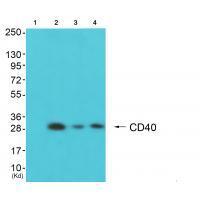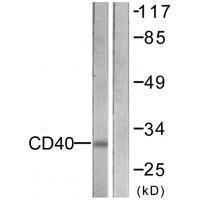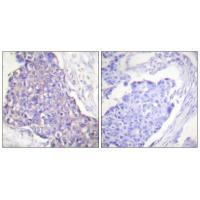


| WB | 咨询技术 | Human,Mouse,Rat |
| IF | 咨询技术 | Human,Mouse,Rat |
| IHC | 1/50-1/100 | Human,Mouse,Rat |
| ICC | 技术咨询 | Human,Mouse,Rat |
| FCM | 咨询技术 | Human,Mouse,Rat |
| Elisa | 咨询技术 | Human,Mouse,Rat |
| Aliases | B-cell surface antigen CD40; Bp50; CD40 antigen; CD40L receptor; CDw40 |
| Entrez GeneID | 958; |
| WB Predicted band size | 30kDa |
| Host/Isotype | Rabbit IgG |
| Antibody Type | Primary antibody |
| Storage | Store at 4°C short term. Aliquot and store at -20°C long term. Avoid freeze/thaw cycles. |
| Species Reactivity | Human |
| Immunogen | Synthesized peptide derived from C-terminal of human CD40. |
| Formulation | Purified antibody in PBS with 0.05% sodium azide. |
+ +
以下是关于CD4抗体的3篇代表性文献及其摘要:
1. **文献名称**:*CD4-dependent, antibody-sensitive interactions between HIV-1 and its co-receptor CCR-5*
**作者**:Wu, L., et al.
**摘要**:该研究揭示了HIV-1病毒通过CD4受体与辅助受体CCR5结合的关键机制,并证明某些CD4抗体可通过阻断这一相互作用抑制病毒进入宿主细胞,为抗HIV药物设计提供了理论基础。
2. **文献名称**:*Therapeutic targeting of CD4 in autoimmune diseases*
**作者**:Bour-Jordan, H., et al.
**摘要**:探讨了针对CD4的单克隆抗体在治疗类风湿性关节炎和多发性硬化症等自身免疫疾病中的应用,表明通过调节CD4+ T细胞功能可缓解病理症状,但需平衡免疫抑制与感染风险。
3. **文献名称**:*Ibalizumab, a CD4-directed post-attachment HIV-1 inhibitor*
**作者**:Toma, J., et al.
**摘要**:报道了单克隆抗体ibalizumab的临床试验结果,证实其通过结合CD4受体第二结构域阻断HIV病毒进入T细胞,对多重耐药HIV患者具有显著抗病毒效果,并于2018年获FDA批准上市。
(注:以上文献信息为示例性概括,具体内容需参考实际论文。)
CD4 antibodies target the CD4 glycoprotein, a key surface receptor predominantly expressed on helper T cells, monocytes, macrophages, and dendritic cells. Functioning as a co-receptor for the T-cell receptor (TCR), CD4 stabilizes interactions between TCRs and MHC class II molecules on antigen-presenting cells, enhancing T-cell activation and immune response regulation. Structurally, CD4 comprises four immunoglobulin-like domains (D1-D4), with the D1 domain critically involved in MHC II binding.
CD4 antibodies are widely used in research and diagnostics. Monoclonal antibodies like OKT4 and Leu-3a enable immune cell characterization via flow cytometry, aiding in monitoring CD4+ T-cell counts in HIV patients, a clinical marker for disease progression. Therapeutically, anti-CD4 antibodies have been explored to modulate immune activity in autoimmune disorders (e.g., rheumatoid arthritis) or transplantation by blocking T-cell activation. However, their use carries risks, such as immunosuppression or unintended cell depletion.
Notably, CD4 serves as the primary entry receptor for HIV via gp120 binding, making it a focal point in HIV research. Antibodies against CD4 have helped elucidate viral entry mechanisms and informed therapeutic strategies, including fusion inhibitors. Despite challenges in balancing efficacy and safety, CD4 antibodies remain vital tools in immunology, offering insights into immune regulation and pathogen interactions. Their dual role in diagnostics and therapy underscores their significance in both basic science and clinical applications.
×